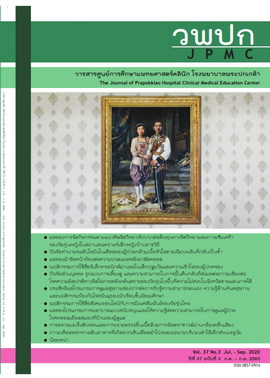The effectiveness of an Oral Health Care Program on Self-efficacy, Dental Knowledge and Dental Caries Preventive Behaviors among Secondary School Students
Main Article Content
Abstract
Background: Dental caries remains significant to the health-related quality of life among early adolescents.
Objectives: This quasi-experimental study aimed to evaluate the effectiveness of an oral health care program on dental knowledge, self-efficacy, dental caries preventive behaviors, the debris index, and the oral hygiene skill achievement index.
Materials and Methods: The sample consisted of 81 students from grade 7 of Bangkratum-pittayakom school. Forty students were assigned to the experimental group and received the dental health program based on self-efficacy, while 41 students were assigned to the control group and received a traditional dental health education. Data were collected by self-efficacy questionnaire, dental health knowledge, dental health preventive behavior, recording the debris index, and the oral hygiene skill achievement index. Data were analyzed by descriptive statistics, Chi-square test, independent t-test, and paired sample t-test.
Results: After finishing the oral health care program, the experimental group had higher mean scores for dental knowledge, self-efficacy, and dental caries preventive behavior, while the oral hygiene skill achievement index increased significantly compared to the control group (p < 0.001, 0.05, 0.05, 0.001). In addition, the debris index score was significantly lower than in the control group (p < 0.001). Furthermore, for the experimental group, the mean scores of dental knowledge, self-efficacy, dental caries preventive behavior, and the oral hygiene skill achievement index increased significantly following the intervention (p < 0.001, 0.05, 0.05, 0.001), while debris index score was significantly lower than before the intervention (p < 0.001).
Conclusion: The result of this study indicated that the dental health program improves dental health knowledge, self-efficacy, dental health preventive behavior, and oral hygiene skill, and decreases the debris index. Moreover, a longitudinal study should be carried out to monitor the sustainability of oral health behaviors.
Article Details
References
World Health Organization. Oral health [Internet]. 2018 [cited 2018 Oct 7]. Available from: http://www.who.int/news-room/fact-sheets/detail/oral-health.
Bureau of Dental Health. National dental health survey report No. 8. Nonthaburi: Ministry of Health; 2018.
Gilchrist F, Marshman Z, Deery C, Rodd HD. The impact of dental caries on children and young people: what they have to say?. International Journal of Paediatric Dentistry 2015;25:327-38.
National Health Security Office. Universal health care coverage handbook [Internet]. 2019 [cited 2020 Mar 2]. Available from: https://www.nhso.go.th/files/userfiles/file/2020/หน่วยบริการ/คู่มือ/63_คู่มือบริหารกองทุน%2063.pdf
Wahengbam PP, Kshetrimayum N, Wahengbam BS, Nandkeoliar T, Lyngdoh D. Assessment of oral health knowledge, attitude and self-care practice among adolescents-a state wide cross-sectional study in Manipur, North Eastern India. Journal of Clinical and Diagnosis Research 2016;10(6):65-70.
Aleksejuniene J, Brukiene V, Dziaugyte L, Peciuliene V, Bendinskaite R. A theory-guided school-based intervention in order to improve adolescents' oral self-care: a cluster randomized trial. International Journal of Paediatric Dentistry 2016;26:100-9.
Bandura A. Self-efficacy: the exercise of control. New York: W.H. Freeman and Company; 1997.
Rosner B. Fundamentals of biostatistics. 5th ed. Duxbery: Thomson learning; 2000.
Buathong C, Promsiripaiboon Y, Vatchalavivat A. The effects of oral health promotion program on dental caries prevention behaviors of grade six students at Ban Banghean School at Plaipraya District, Krabi Province. Community Health Development Quarterly Khon Kaen University 2015;3:293-306.
Omale JJ. Oral health knowledge, attitudes, and practices among secondary school students in Nigeria [Dissertation]. Washington: Walden University; 2014.
Kaewsutha N, The causal structural relationship model and effectiveness of the behavioral modification program on oral hygiene status of early adolescents [Dissertation]. Bangkok: Srinakharinwirot University; 2015.
Kaewkamnerdpong I. Oral health-related quality of life and school performance associated with socioeconomic status, social capital and school environmental factors: a study in grade 6 primary school children in Sakaeo Province [dissertation]. Bangkok: Chulalongkorn University; 2016.
Greene JC, Vermillion JR. The oral hygiene index: a method for classifying oral hygiene status. The Journal of the American Dental Association 1960;61:172-9.
Niederman R, Sullivan TM. Oral hygiene skill achievement index l. Journal of Periodontology 1981;52: 143-9.
Dettori JR. Loss to follow-up. Evidenced-Based Spine-Care Journal 2011;2:7-10.
Ghorbani B, Shahnazi H, Hassanzadeh A. Improving student's self-efficacy and perceived susceptibility toward oral and dental health: a randomized controlled trial. Oman Medical Journal 2018;33:423-8.
Junthorn R. Effectives of dental health education program for changing dental health behavior of primary students in Muang municipality school in Namuang Subdistrict, Muang District, Chachoengsao Province. The Journal of Prapokklao Hospital Clinical Medical Education Center 2016;33:340-53.
Lotrakul M, Sukanich P. Ramathibodi Essential Psychiatry. 4th ed. Bangkok: Ramathibodi Hospital; 2015.

